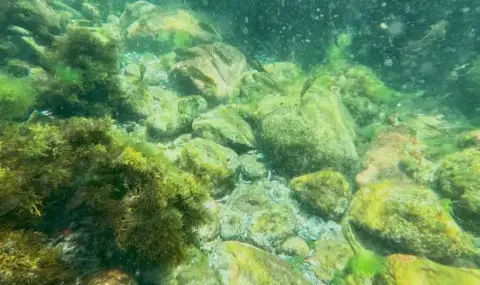Recovery of Black Sea mussel populations is noticeable along the coast of Sozopol. This is noted by most divers there, BNT reported.
For them, this trend is very positive, after many years they have been used to seeing a desert of clams, because of the invasion of invasive rapans. What symptom is this and is there any hope for the Black Sea clam?
The change is quite distinct. The stones are overgrown with shells. Not that rapans have disappeared. But something has happened and the clams are there. Everywhere around the island of "St. Ivan" against Sozopol.
"Whether from the cleaner seas that we have, whether from the action of the treatment plants, or from the intensive collection of rapans – we observe that everything has returned, the clams, the life, and the poplars, and the leeches and the bottom fish, which are circling around these mussel aggregations," commented diving instructor Nayden Nedev.
Mussels have not yet managed to develop evolutionary mechanisms against the predator that has just arrived with the ships. And the rapans in our waters, without a natural enemy, multiply at will, leaving behind a mussel desert.
"There were years when the entire bottom was strewn with only clam shells," the diver added.
But marine biologists are not so enthusiastic. For them, the revival of mussel populations is local and temporary.
"Well, in general, restoration and control of the population of invasive species in the seas is practically impossible with human activities. In the summer, when it is warm and the rapans are very active, they massively concentrate where there is a black clam. And they can in one season destroy all mussels in a given area, as in Sozopol in 2019," explained Dr. Dimitar Berov from the Institute of Biodiversity and Ecosystem Effusions, BAS.
Having devastated everything around them, they have now moved on to the next mussel population and those here can catch their breath. But it will be for a short time. And the rapants probably won't help much.
"Due to the buying of rapani for the Asian markets, groups are organized here, which started working and extracting rapani and that's how people get their income,'' added Nayden Nedev.
"The problem with collecting rapani is that the rapani do not collect the small rapani, and they are also very massive and develop very quickly," added Dr. Dimitar Berov.
And so, south of Ahtopol, where the water is also warmer, the black mussel along the coast has been almost absent for decades. But it's not completely gone. She just moved to the deep end.
"Below 40-50 meters in the shelf, where the impact of rapanes is less, because the water is colder for a longer period of the year, and there is almost no impact of rapanes there. And these mussels, in fact, feed the coast with larvae that can colonize the bare rocks," added Dr. Berov.
And protecting these deep-sea populations may give the clams some edge in their unequal battle with rapans. As long as there is someone to control the malicious trawling.
